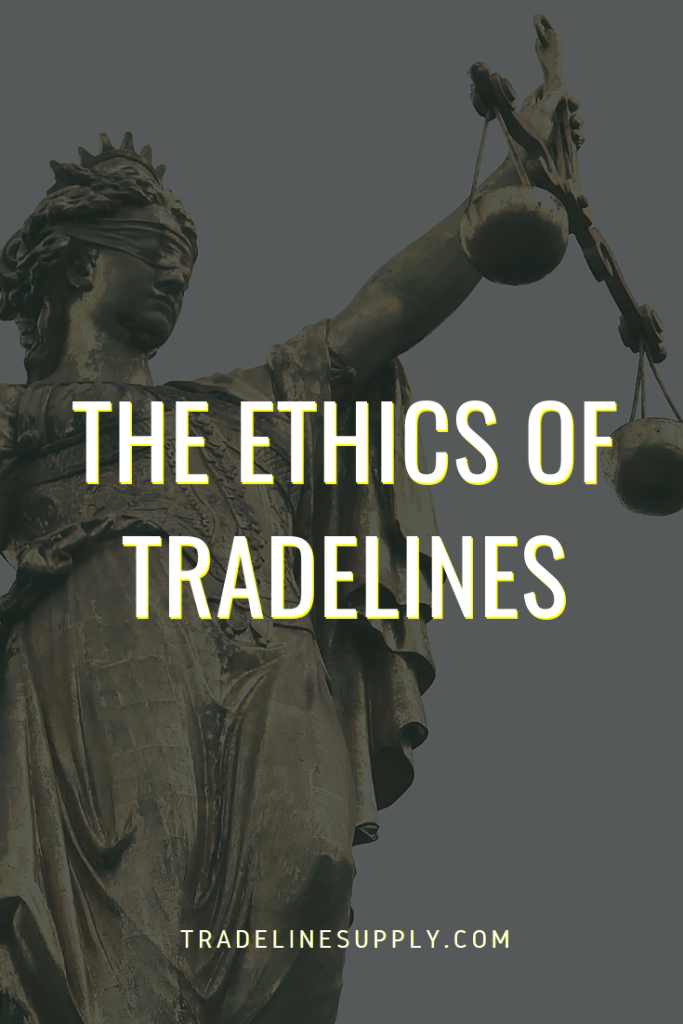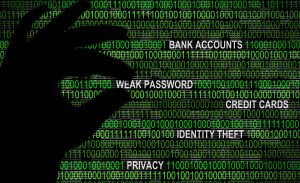The Ethics of Tradelines

Tradeline Supply Company, LLC Raises Minimum Criteria to Join Credit Partner Program
07/23/2018The Ethics of Tradelines
Tradelines and credit piggybacking are controversial topics, so much so that many people ask the question “are piggybacking and buying and selling tradelines ethical?” We want to shed light on some perspectives that may not be immediately obvious.
If you are reading this article, then you probably already know what tradelines are and how they work. We wanted to take a moment to shed light on some perspectives that may not be immediately obvious.
Buying and selling tradelines and credit piggybacking are controversial topics, so much so that many people ask the question, “are piggybacking and buying and selling tradelines ethical?”
You will find a wide spectrum of opinions regarding the ethics of buying and selling tradelines. Perhaps some people may view tradelines as unethical, but are there valid arguments suggesting that using tradelines to piggyback credit is perfectly ethical?

First, let’s identify what the perceived problem is with tradelines.
The main argument against exchanging tradelines is the belief that people are artificially boosting their credit score and, as a result, can obtain credit that they otherwise would not have been qualified for. There are really two elements here: (1) artificially boosting a credit score (2) people gaining access to credit that they otherwise would not have had access to.
Let’s deal with these two issues individually.
Manipulating Credit Scores
Here is the million dollar question: Is it unethical to take an action within the legal limits of the law that can positively affect one’s credit score?
Aside from tradelines, there is manipulation of credit scores going on all the time on a massive scale.
For example, if someone applied for a loan at a bank and they got denied credit, the bank is required to tell the consumer why their credit application was denied. It may list several reasons, such as their credit score was too low, maybe debt utilization was too high, or maybe they just did not have enough credit history.
In the case of their debt utilization being too high, let’s assume all their credit cards had utilizations above 50%. Then the consumer borrows some money from their sister and pays down all the balances to the 15% utilization mark and re-applies for the loan. The bank pulls a new credit report and sees their credit score jumped by 30 points, so they grant the person the loan.
Did they just manipulate their credit score? Is that unethical?
Let’s consider another hypothetical example. Someone’s child just turned 18, has no credit whatsoever and wants to apply for a car loan. When they apply for the loan, they find out they do not even have a credit score at all.
Naturally, mom and dad want to help, so they add their child to two of their oldest credit cards as an authorized user. All of a sudden their credit score goes from non-existent to a 730.
Guess what? The loan is approved! In this example, the parents did not intend to give their child access to that credit card. They only did it for credit-building purposes. Is this ethical?
Last example. A husband and wife have been married for 30 years. The husband worked while his wife was a homemaker who raised their four kids and she never had any credit cards in her name. She applied for a loan at the bank and got denied.
Then her husband adds her as an authorized user on several aged credit cards, her credit score shoots up, and she then gets the loan. Is this ethical?
In these examples, did the people manipulate their credit score for the purpose of getting a loan? Would they have been approved for these loans without taking these actions, which ultimately affected their credit score for the better?
From these illustrations, it should be clear that people change variables in their credit profiles in many different ways, often for the purpose of increasing their credit score. So is the very act of intentionally changing a variable in one’s credit file for the purpose of improving their credit score unethical?
People pay down their credit cards to change their utilization ratios, open new credit cards to show more open lines of credit, pay off collections, and the very banks who issue these credit cards openly promote the idea of adding their kids to their credit cards as authorized users to help give them a credit boost early in life. So it always comes down to where you draw the line.
Gaining Access to Credit by Manipulating Credit Scores
The examples above are just a few of the many ways that people commonly take actions to change their credit score, and these methods are considered completely acceptable, and sometimes even promoted by the banks who are issuing credit. And in all these examples, people gained access to credit that they otherwise would not have had access to.
Were all these people unethical? Is it unethical that many banks openly promote credit card users adding their spouses or children as authorized users strictly for the credit boost?
Or, if a credit score is such a fickle metric that can be so easily manipulated, is it ethical that banks are making their underwriting decisions using such a weak variable? Is the whole credit scoring model flawed? Is it ethical that the credit bureaus have successfully convinced entire industries to rely on their credit scoring models to make underwriting decisions?
Back in the 2006-2011 mortgage meltdown, who was more unethical: the consumers who applied for a no income, no asset loan and then defaulted, or the bankers who offered those loans? I think most people agree that the banks were at fault.
On March 5, 2010, the Federal Reserve Board published a 32-page report on credit piggybacking. They analyzed the credit records of a nationally representative sample of approximately 300,000 people across the United States.
They found that over 33% of people had authorized user accounts in their credit profile and that those authorized user accounts tended to be superior tradelines to the primary accounts they had under their own name.
So essentially, this suggests that over one-third of Americans are benefitting from credit piggybacking. Another point worth mentioning is that minorities tended to have fewer authorized user accounts and benefited less from them compared to whites.
So is one-third of our entire nation doing something unethical by adding authorized user tradelines to their credit profile? What percentage of the population has knowingly changed a variable in their credit report to try to increase their credit score?
As consumers, we are encouraged to “build” our credit and to follow the recommended tips and tricks to get a high credit score. From day one as a legal adult, banks recommend that we ask our parents to add us to their credit cards as authorized users in order to give us a credit score boost.
But what if we were not fortunate enough to have parents with good credit to benefit from? Would it be OK to ask a friend? How about a neighbor? How about a business partner?
What about buying one? How much of a difference is there really in purchasing one compared to the many other ways people get added to cards as authorized users? Is a consumer more loan-worthy if their aunt added them as an authorized user versus the consumer buying a tradeline online?
In terms of banks giving out loans, we have already seen what they are capable of. They have not been known to be the most ethical institutions on the planet.
To the contrary, their greed has contributed to what has been dubbed the “Great Recession” which brought down the entire global economy. And that was partly because banks loaned out billions of dollars that consumers could not repay, largely based off a credit score as opposed to what really makes sense, which is making consumers prove they have the ability to repay.
So was it more unethical that consumers played the credit score game by the legal rules or was it irresponsible for banks to loan money to people who could not afford to repay those loans? When was the last time a bank asked you to prove your income when you applied for a credit card? Did they even make you prove that you have a job? If banks do not verify income before approving someone for a loan, is that unethical?
Who is to blame here? Is it the banks that decide to have guidelines that are so loose that sometimes the wrong people get loans and cannot repay?
Is it the outdated and flawed credit scoring model? Is it the consumer’s fault for finding legal loopholes in the credit scoring and financial systems? Or is it some bigger regulatory institution’s fault for allowing such legal loopholes to exist?
We are not here to provide the answers but rather to increase awareness of the situation and to provide points that are not necessarily obvious. The average person might think it is the consumer who is the problem when in fact they are just joining the ranks of the other one-third of our nation who already have access to authorized user tradelines.
This article is copyrighted by Tradeline Supply Company, LLC and any use is strictly prohibited without prior written consent. Updated 6/16/2019.




1 Comment
I was told that it would be wise not to purchase a tradeline for my daughter that’s older than her 18th birthday. She’s 21,so getting tradelines of a 3+ year history is a really tight fit. I was also told, to have a successful credit score jump…you need to have at least 3 seasoned tradelines of 3+ years or so.Can my daughter get an effective credit score jump or an unsecured high credit limit credit card with a tradeline that is prior to her 18th birthday?